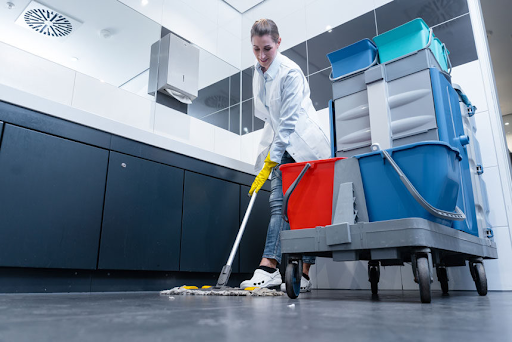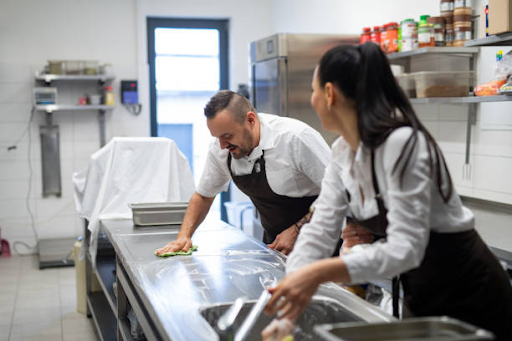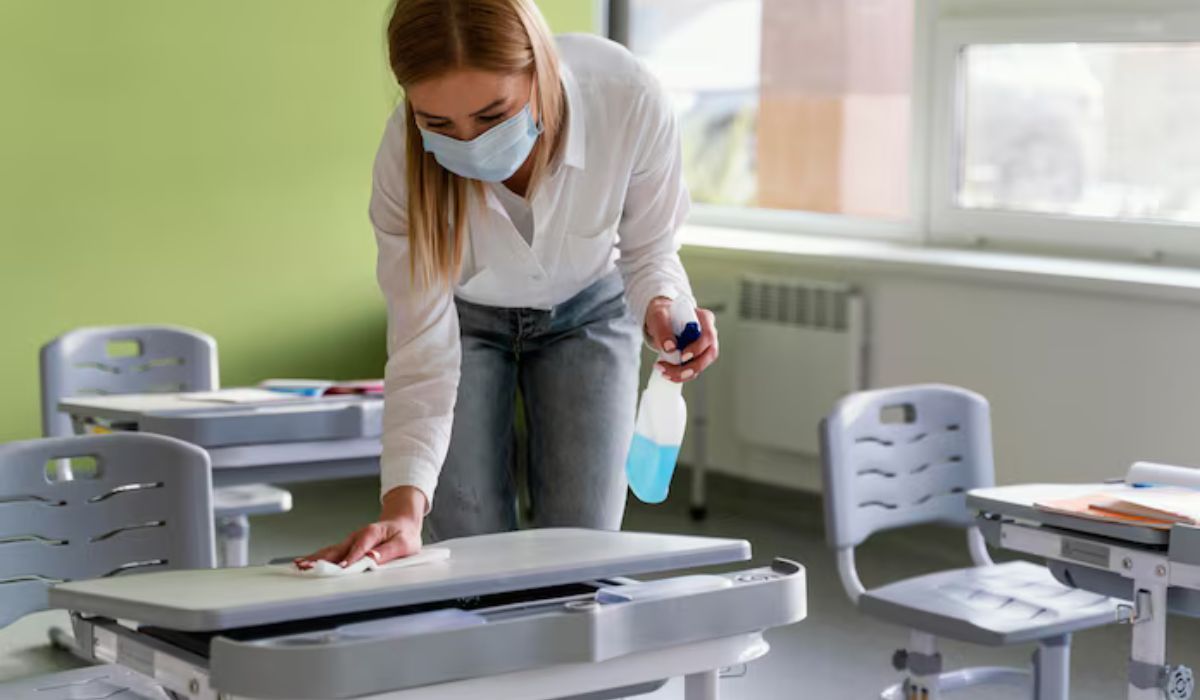Commercial Kitchen Cleaning Sydney | HACCP Food Safety
Maintaining cleanliness in a commercial kitchen is essential—not only for creating a safe, hygienic environment but also for ensuring compliance with stringent health and safety regulations. From preventing foodborne illnesses to passing health inspections, a well-cleaned kitchen is crucial to the success and reputation of any food establishment. However, commercial kitchens face unique challenges: high foot traffic, continuous food preparation, and the need for rigorous cleaning to prevent the buildup of grease, bacteria, and contaminants. In this guide, we’ll cover essential cleaning practices to help ensure a safe, compliant kitchen, and how a meticulous cleaning routine can enhance both the efficiency and reputation of your business.
The Importance of Cleaning Commercial Kitchens
Why Kitchen Hygiene is Crucial for Your Business
Maintaining a clean kitchen isn't just about appearances—it’s crucial for preventing foodborne illnesses and maintaining customer trust. A dirty kitchen can lead to the spread of bacteria like E. coli, salmonella, and listeria, which can contaminate food and surfaces, risking the health of customers and employees alike. Food safety should always be a priority in the kitchen, as an outbreak of foodborne illness can damage your reputation, result in legal ramifications, and harm customer loyalty. In Sydney, where food establishments are held to high standards by local health authorities, hygiene practices are essential for business survival.
The Role of Cleaning in Health and Safety Compliance
Commercial kitchens are subject to rigorous health inspections, and failing to comply with food safety regulations can lead to fines, shutdowns, and even business closures. Regular cleaning is essential to meet these regulatory standards and demonstrate your commitment to safety. For example, Sydney health codes require regular cleaning and maintenance of all equipment and surfaces used in food preparation, as well as proper waste disposal, to prevent the growth of mold, bacteria, and other hazards. Cleaning practices help minimize risks and ensure that kitchens are prepared for routine health inspections, saving businesses from costly compliance issues.
Key Areas to Focus on When Cleaning Commercial Kitchens
High-Touch Surfaces and Equipment Cleaning
In a busy kitchen, there are certain surfaces and equipment that are constantly handled, making them prime areas for contamination. These high-touch surfaces include countertops, door handles, light switches, and commonly used kitchen tools. Cleaning these areas with the correct sanitizers and disinfectants is critical to preventing the spread of bacteria and viruses. It’s also essential to sanitize equipment like refrigerators, ovens, and microwaves, as grease, grime, and food residue can accumulate quickly and become breeding grounds for bacteria if left uncleaned.
Proper Cleaning Techniques for Different Kitchen Zones
Each zone in a kitchen requires specialized cleaning to ensure thorough sanitation.
- Cooking Areas: Since grease and spills are common here, cleaning products that break down grease without leaving residue are essential. Ensure the stovetops, burners, and splashbacks are scrubbed thoroughly to prevent buildup.
- Prep Stations: These areas come into direct contact with food, so regular disinfection is vital. Wipe down cutting boards, surfaces, and utensils with food-safe sanitizers after every use to avoid cross-contamination.
- Storage Areas: Refrigerators, freezers, and pantry shelves should be cleaned weekly to avoid mold growth and pest infestations. Remove any expired items, clean surfaces, and ensure that everything is stored in sealed containers to maintain freshness and hygiene.
Effective Cleaning Protocols for Commercial Kitchens
Daily vs. Weekly Cleaning Routines
Implementing a structured cleaning schedule helps keep a commercial kitchen safe and compliant.
- Daily Cleaning: End-of-day cleaning tasks include wiping down all surfaces, sweeping and mopping floors, emptying trash bins, and sanitizing high-touch surfaces. Daily cleaning is critical for keeping bacteria and food residue from accumulating.
- Weekly Cleaning: Deep cleaning tasks are best scheduled weekly, as they take more time and cover areas that may not be part of daily tasks. Weekly cleaning includes scrubbing ovens and hoods, cleaning under and behind equipment, emptying and cleaning refrigerator shelves, and sanitizing walls and hard-to-reach areas. A set schedule ensures that all parts of the kitchen are cleaned regularly, keeping your establishment prepared for unexpected inspections.
Similarly, in workplace settings, a consistent daily cleaning plan—like those used in office cleaning routines—can reduce the spread of illness and maintain employee wellbeing.
Using the Right Cleaning Supplies and Equipment
Choosing appropriate cleaning supplies and equipment is key to effective sanitation. Use commercial-grade sanitizers, degreasers, and detergents specifically designed for food service areas. For example, grease-removing products help keep kitchen surfaces free of the sticky residue that attracts dirt and pests. Other essentials include disposable gloves, microfiber cloths, scrubbing brushes, and mop heads that can be sanitized or replaced frequently. High-quality supplies and equipment will make cleaning more effective and efficient, allowing your staff to maintain hygiene standards with ease.
Health and Safety Compliance Tips for Commercial Kitchens
Understanding Food Safety Standards and Regulations
Food establishments in Sydney are required to follow local health codes that set standards for kitchen hygiene, food storage, and preparation practices. Familiarize yourself with Sydney’s Food Safety Regulations, which outline specific cleanliness requirements for commercial kitchens. Obtaining a food safety certification, such as HACCP (Hazard Analysis Critical Control Point),can also demonstrate your commitment to health and safety. Certification requires strict adherence to food safety practices and can enhance customer confidence in your establishment.
Preparing for Health Inspections: What You Need to Know
Health inspections can occur without prior notice, so maintaining a consistently clean kitchen is essential. Organize all cleaning logs, inspection documentation, and certificates in a readily accessible location. Inspectors will typically look at kitchen cleanliness, equipment condition, and pest control measures. Ensure that all surfaces are clean, food is stored properly, and waste is disposed of regularly. Familiarize your staff with inspection standards so they understand the importance of keeping areas neat, sanitary, and ready for review. By following these practices, you can feel confident that your kitchen will pass inspections without issues.
Conclusion
Maintaining a clean commercial kitchen is essential for the health and safety of both staff and customers. Regular cleaning not only helps prevent foodborne illnesses and pest infestations but also ensures compliance with stringent health regulations. By implementing daily and weekly cleaning routines, using appropriate supplies, and training staff on food safety standards, you can maintain a safe, efficient, and reputable kitchen environment. A commitment to cleanliness goes beyond compliance; it builds customer trust, enhances operational efficiency, and sets your business apart as a reliable, responsible food establishment.
FAQs about The Ultimate Guide to Cleaning a Commercial Kitchen
What are the best practices for cleaning a commercial kitchen?
Best practices include following a structured cleaning schedule, using appropriate cleaning products, and prioritizing high-touch areas. Consistency and thoroughness are key to maintaining hygiene.
How often should a commercial kitchen be cleaned?
Most areas require daily cleaning, while deep cleaning of appliances, storage areas, and hard-to-reach spots should be done weekly. Maintaining a routine will ensure continuous compliance and prevent buildup.
What cleaning supplies are recommended for commercial kitchens?
Use commercial-grade products that sanitize and degrease effectively. Recommended supplies include food-safe sanitizers, grease-cutting detergents, and disposable or
washable cleaning materials.
How can I ensure compliance with health and safety regulations?
Stay informed about local health codes and maintain a consistent cleaning routine. Certification programs like HACCP can also guide compliance and build customer trust.
What should I do if my kitchen fails a health inspection?
Review the inspector’s recommendations, address deficiencies immediately, and strengthen your cleaning protocols. Scheduling regular staff training on hygiene practices can prevent future issues.




